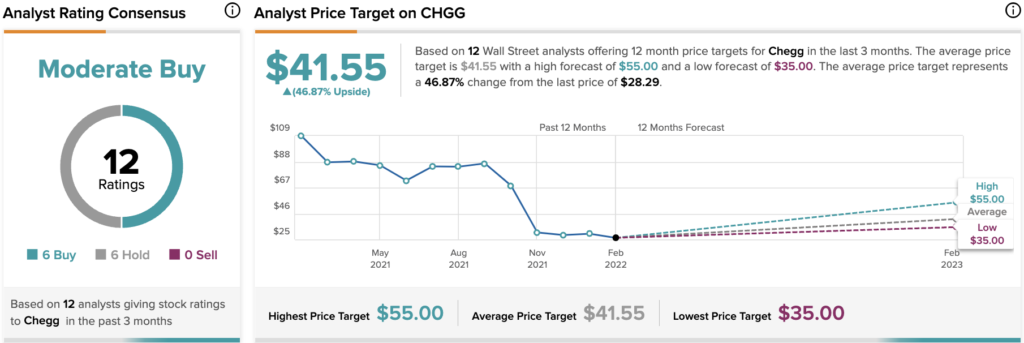Chegg, Inc. (CHGG) is a growing, comprehensive e-learning services company. After attracting a lot of attention during the COVID-19 pandemic for its lockdown-friendly platform, CHGG recorded tremendous price growth, with many analysts stating valuation concerns. As the stock has seen a massive decline since its February 2021 highs, it is clear that the market rotation away from high-flying growth names is primarily affecting stocks with aggressive multiples.
In this analysis, Chegg’s current financial position is examined along with its valuation and recent developments. With markets drowning in uncertainty and in an inflationary environment that yearns for more overreach by the Fed, despite the sizable pullback, the stock’s outlook remains rather precarious.
Recent Developments and Price Performance
The previous six months have marked one of the most significant re-ratings in recent history, and while the broader market has come down, the impact on growth stocks has been far more severe. Even compared to the popular Ark Innovation ETF, a poster-child for high valuation and aggressive growth equities, Chegg has suffered considerably higher losses.
After a weaker-than-expected outlook that the company provided in its Q3 earnings report last November, the stock plunged more than 40% and has been trailing sideways ever since. Currently, Chegg trades below its pre-pandemic levels, at a $4.2 billion market cap.
Q3 results detailed a drop in college enrollments as a driver for slower future revenue growth. Despite double-digit year-over-year growth, Chegg undershot revenue expectations. An underwhelming outlook delivered by the company was the determining factor for Chegg’s downfall, as analysts expected significantly stronger guidance. The company projected Q4 revenue of $194 million-$196 million, compared to a consensus forecast of nearly $242 million. Even as management claims that the decrease in college enrollment is likely a short-term effect of the COVID-19 pandemic and a very strong employment market, investors seem unconvinced.
After a disappointing outlook provided in the third quarter, the more recent Q4 results offered some comfort to investors. The company exceeded 1.5 million international subscribers for the year, while posting mid-single digits year-over-year subscriber and services revenue growth. Revenue guidance for the upcoming quarter came in the range of $200 million to $205 million, slightly above analysts’ expectations. For the entire 2022 fiscal year, revenue is expected to reach between $830 million and $850 million.
A constant point of strength for Chegg has been the company’s profitability, at least at the gross and EBITDA margin levels thus far. Gross margins for 2021 stood at 67.2% and are expected to rise to between 71% and 72% in 2022. As Chegg still aggressively increases R&D spending, EBITDA margins currently stand at 11%, while a 13% levered FCF margin provides some confidence.
The Future of the Business
There is a lot to like about Chegg’s business model. An integrated Direct-to-Student e-learning platform, accessible through a subscription-based program, can maintain competitive advantages and strong profit margins. Growing both organically and through acquisitions, Chegg aims to become a one-stop-shop for students of different ages and backgrounds, leaving a huge addressable market up for grabs.
Even though the COVID-19 pandemic has accelerated remote learning trends due to external circumstances, the core philosophy of e-learning is here to stay as more and more students discover its value and practicality. Chegg has a lot of room for international expansion as well. Its acquisition of Busuu, an online language learning platform, also increases Chegg’s addressable market and outreach, while making the overall platform more comprehensive.
The main challenge for Chegg over the long-term, apart from the sustainable generation of net income, will be its response to growing competition. While the e-learning market is still fragmented and competition currently appears somewhat weak, investors should expect large technology players to dip into the industry over the next few years. In the case that companies like Amazon or Google provide their own e-learning services, Chegg could see subscriber growth and margins decrease, threatening the company’s long-term survival.
On the other hand, since the company already holds some major competitive advantages with a large subscriber base and growing name recognition, the idea of Chegg becoming a target for acquisition is not too far-fetched. Especially given the recent stock price downfall, Chegg might present a hard-to-overlook opportunity.
Valuation
It should go without saying that a massive stock price pullback would inevitably force valuation multiples to contract. This is especially true for Chegg; as of February 2020, the company was trading at over 20x P/S and 60x P/FCF multiples. Today, the same multiples stand at much more reasonable 6x and 15x levels.
Considering that even though growth prospects are not as attractive as once thought, Chegg still has serious growth potential ahead. This fact, combined with strong margins and an impressive cash & cash equivalents build-up, now amounting to over $800 million (a fifth of Chegg’s market cap), imply that the company currently trades at a relatively attractive valuation.
Wall Street’s Take
Turning to Wall Street, Chegg has a Moderate Buy analyst rating consensus, based on 6 Buys and 6 Holds assigned in the last three
months. The average Chegg price target is $41.55, representing a 46.87% upside from current price levels, with a high forecast of $55 and a low forecast of $35.

Final Thoughts
Despite its fluctuating results, Chegg’s stock price performance will mainly depend on the market’s appetite for risk. If the current trend towards blue-chip, historically reliable names continues, it will be at the expense of newcomers that have yet to prove their longer-term sustainability case, such as Chegg. This weakness leads me to opine that CHGG is unlikely to see significant upward movement. Even as valuation metrics point to a more reasonably valued stock, negative sentiment could be a key bearish factor.
Download the TipRanks mobile app now
To find good ideas for stocks trading at attractive valuations, visit TipRanks’ Best Stocks to Buy, a newly launched tool that unites all of TipRanks’ equity insights.
Read full Disclaimer & Disclosure
















